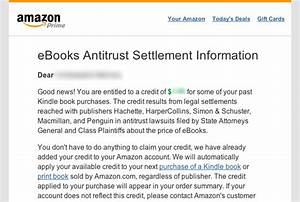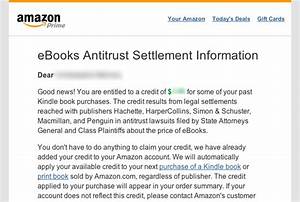Breaking News: Five Accused of Ebook Price-Fixing on Amazon.com - A Shocking Case of Antitrust Violation Unveiled!

Amazon.com is taking five publishers to court for allegedly price-fixing eBooks. The accused include Penguin, HarperCollins, and Simon & Schuster.
Amazon.com, the world's largest online retailer, has been at the center of a price-fixing scandal involving ebooks. Five major publishers have been accused of conspiring with Amazon to inflate ebook prices and limit competition. The allegations have shaken the publishing industry and raised concerns about the future of digital reading.
According to the lawsuit, the five publishers – Hachette, HarperCollins, Macmillan, Penguin, and Simon & Schuster – colluded with Amazon to set artificially high prices for ebooks. This allowed them to maintain their dominance in the market and prevent smaller publishers and independent authors from gaining a foothold.
The case has been ongoing for several years, with Amazon denying any wrongdoing and the publishers either settling or going to trial. The outcome of the case could have significant implications for the ebook market and the publishing industry as a whole.
As readers, we rely on fair competition and reasonable prices to access the books we love. The allegations against Amazon and the publishers threaten that balance and raise important questions about the future of digital reading. How will this case affect the availability and affordability of ebooks? What role will Amazon play in shaping the industry? Only time will tell.
The Accusations Against Amazon.com for eBook Price Fixing

Amazon.com, in recent years, has faced multiple accusations of engaging in anti-competitive practices. One such allegation is that the e-commerce giant has been involved in fixing prices of eBooks in collusion with publishers. The company has been accused of pressurizing publishers to adopt a particular pricing model for their eBooks, thereby stifling competition and hurting consumers.
The Five Publishers Accused of Colluding with Amazon.com

The United States Department of Justice (DOJ) had filed a lawsuit against Apple Inc. and five major book publishers in 2012 for conspiring to set eBook prices. The publishers named were Hachette Book Group, HarperCollins, Macmillan Publishers, Penguin Group, and Simon & Schuster. A settlement was reached later, but Amazon.com was not a part of it.
Amazon's Tactics to Control eBook Prices

Amazon.com has been accused of employing a variety of tactics to control the prices of eBooks. The company was allegedly offering publishers incentives such as higher royalty rates and increased visibility on the website in exchange for adopting its preferred pricing model. This practice gave Amazon.com an unfair advantage over other eBook retailers and hindered competition.
The Impact on Publishers and Authors

The fixed pricing model adopted by Amazon.com had a negative impact on publishers and authors. Under this model, Amazon.com was able to dictate the prices of eBooks, which resulted in lower revenues for publishers and authors. Many independent authors and small publishers were forced out of business due to the lack of pricing flexibility and unfair competition.
The Consumer Impact

Consumers were also adversely affected by the alleged price-fixing scheme. The fixed prices of eBooks meant that consumers had to pay higher prices for eBooks. The lack of competition also meant that consumers had limited options, and they were forced to purchase eBooks from Amazon.com at inflated prices.
The European Union Investigation

In 2015, the European Union (EU) launched an investigation into Amazon.com's eBook pricing practices. The EU accused Amazon.com of anti-competitive practices and violating EU antitrust laws. The investigation is still ongoing, and the company could face significant fines if found guilty.
The Current Status of the Accusations Against Amazon.com

The current status of the allegations against Amazon.com for eBook price-fixing is uncertain. The company has denied any wrongdoing and has argued that it is not engaging in anti-competitive practices. However, the ongoing EU investigation and public scrutiny may force the company to change its pricing practices.
The Need for Fair Competition in the eBook Market
The allegations against Amazon.com highlight the need for fair competition in the eBook market. The lack of competition can lead to inflated prices, limited options, and reduced revenues for publishers and authors. It is essential that regulatory bodies ensure that all players in the eBook market adhere to fair competition practices to protect the interests of consumers, authors, and publishers.
The Future of eBook Pricing
The future of eBook pricing remains uncertain. It is clear that Amazon.com's dominance in the market has had a significant impact on the pricing of eBooks. However, with increased scrutiny and regulatory oversight, it is possible that the market could become more competitive, leading to reduced prices and increased options for consumers.
Conclusion
The allegations against Amazon.com for eBook price-fixing are serious and merit investigation. Fair competition in the eBook market is crucial to protect the interests of all stakeholders. It is essential that regulatory bodies continue to monitor the market to ensure that all players adhere to fair competition practices.
Introduction: Allegations of ebook price-fixing at Amazon.com
In 2021, the US Justice Department filed an antitrust lawsuit against Amazon.com and five major book publishers alleging that they colluded to fix prices of ebooks. The lawsuit comes after a years-long investigation into the pricing practices of the publishing industry, which has been accused of anti-competitive behavior in the past. The charges specifically relate to agreements between Amazon and the publishers that allegedly restricted competition and increased prices for consumers.
The five entities accused of collusion
The five entities named in the lawsuit are Hachette Book Group, HarperCollins Publishers, Macmillan Publishers, Penguin Random House, and Simon & Schuster. These companies represent some of the largest book publishers in the world and are responsible for many of the most popular books on the market today. The lawsuit alleges that these publishers worked together to force Amazon to adopt a new pricing model that would increase the cost of ebooks for consumers.
The antitrust case against Amazon and the alleged co-conspirators
The antitrust case against Amazon and the book publishers centers around allegations of collusion to fix prices and limit competition in the ebook market. The lawsuit alleges that the publishers conspired with Amazon to implement a pricing model known as agency pricing, which allowed the publishers to set the price of their ebooks and required Amazon to take a 30% commission on all sales. This model replaced the previous wholesale model, where Amazon purchased ebooks from publishers at a discount and then set its own retail price.
Investigation timeline: What led to the charges?
The investigation into ebook price-fixing began in 2010 when the Department of Justice launched an investigation into Apple's pricing practices for ebooks. The investigation found that Apple had colluded with publishers to fix prices and eliminate competition in the ebook market. In 2012, the Department of Justice filed a lawsuit against Apple and five major publishers, including four of the five companies named in the current lawsuit against Amazon.
The impact of price-fixing on readers and authors
Price-fixing has a significant impact on both readers and authors. For readers, it means higher prices for ebooks, which can discourage them from purchasing books or limit the number of books they can afford to buy. For authors, it means lower royalties and less income from their work. Price-fixing also limits competition in the market, making it harder for new authors to break into the industry and for smaller publishers to compete with larger ones.
Price-fixing in the digital age: How is it different from traditional book publishing?
Price-fixing in the digital age is different from traditional book publishing because of the ease and speed at which prices can be changed. In traditional book publishing, prices are set by the publisher and remain fixed for a period of time. In the digital age, prices can be changed instantly and often. This means that publishers can adjust prices in response to market conditions or changes in demand, but it also means that they can collude to fix prices more easily.
Previous antitrust cases involving Amazon
This is not the first time that Amazon has been the subject of antitrust investigations or lawsuits. In 2019, the European Union launched an investigation into Amazon's treatment of third-party sellers on its platform, citing concerns about anti-competitive behavior. In the US, Amazon has faced scrutiny over its dominance in the online retail market, with some lawmakers calling for the company to be broken up.
Potential legal consequences of the allegations
If found guilty of price-fixing, Amazon and the five publishers could face significant legal consequences. The Department of Justice has asked for both monetary damages and injunctive relief to prevent the companies from engaging in anti-competitive behavior in the future. The companies could also face reputational damage and loss of market share if consumers lose trust in their pricing practices.
Implications for the ebook market and competition
The allegations of price-fixing have significant implications for the ebook market and competition. If the publishers colluded to fix prices, it would limit competition and make it harder for smaller publishers and independent authors to compete. It could also discourage readers from purchasing ebooks and lead to a decline in the overall market. However, if the lawsuit succeeds in breaking up the alleged collusion, it could lead to increased competition and lower prices for consumers.
Conclusion: The ongoing saga of Amazon.com and antitrust regulation
The antitrust lawsuit against Amazon and the five major book publishers is just the latest in a series of investigations and lawsuits related to the company's dominance in the market. While the outcome of the lawsuit is unclear, it highlights the need for continued scrutiny of Amazon and other large tech companies to ensure fair competition and pricing practices in the digital age.
Amazon.com, one of the world's largest online retailers, has been accused of ebook price-fixing by five major publishers. This has sparked a debate on the pros and cons of such practices in the publishing industry.
Pros of ebook price-fixing:
- Stability in pricing: when publishers agree on fixed prices for ebooks, it ensures that consumers will not be confused or deterred by fluctuating prices.
- Protecting the value of intellectual property: by setting a minimum price for ebooks, publishers can ensure that their works are not undervalued and that they receive fair compensation for their efforts.
- Encouraging innovation: with more predictable profits, publishers can invest more in new technologies and innovative book formats, leading to a better reading experience for consumers.
Cons of ebook price-fixing:
- Reduced competition: when publishers agree on fixed prices, it eliminates competition between them, which can ultimately lead to higher prices for consumers and less choice in the market.
- Restricts access to information: when ebooks are priced too high, it can limit access to important information for those who cannot afford it.
- Violates antitrust laws: in many countries, including the United States, price-fixing is illegal as it violates antitrust laws, which are in place to protect consumers from monopolies and unfair business practices.
Dear valued blog visitors,
We wanted to bring to your attention the recent news regarding Amazon.com and five accused eBook price-fixing without title. The U.S. Department of Justice has charged five publishers for allegedly colluding with Apple Inc. to fix eBook prices. This case serves as a reminder of the importance of fair competition within the industry, and we want to reassure our customers that Amazon.com remains committed to upholding ethical business practices.
At Amazon.com, we believe in offering our customers the best possible prices and selection. We understand the value of competition and strive to provide a platform that supports independent publishers and authors. We work hard to ensure that our prices are fair and competitive, and we will continue to do so. Our commitment to providing a positive customer experience is paramount, and we will always put our customers first.
In conclusion, we would like to thank you for your continued support of Amazon.com. We take pride in being a trusted source for books, eBooks, and other products. We will continue to uphold our high standards of business ethics and provide our customers with the best possible shopping experience. If you have any questions or concerns, please do not hesitate to reach out to our customer service team. Thank you.
Recently, there have been questions surrounding Amazon.com and five accused eBook price fixing. Here are some of the most common questions people ask:
-
What is the eBook price fixing case against Amazon?
The case involves Amazon.com and five of the largest book publishers in the United States. The publishers were accused of conspiring with Amazon to fix the prices of eBooks, which resulted in consumers paying higher prices for these digital books.
-
Who were the five publishers involved in the case?
The publishers involved were Hachette, HarperCollins, Macmillan, Penguin, and Simon & Schuster.
-
What was the outcome of the case?
All five publishers settled with the Department of Justice, but Amazon did not. Amazon argued that they were not involved in any conspiracy to fix prices and that they were simply trying to compete in the eBook market.
-
What was the impact of the alleged price fixing on consumers?
Consumers likely paid more for eBooks than they should have due to the price fixing. The alleged conspiracy also made it difficult for smaller eBook retailers to compete with Amazon.
-
Is Amazon still involved in the eBook market?
Yes, Amazon is still a major player in the eBook market. However, they have faced increased competition from other retailers and publishers who have entered the market in recent years.
In conclusion, the eBook price fixing case against Amazon and five publishers had a significant impact on the eBook market. The case highlighted the need for fair competition and transparency in the digital book industry.
